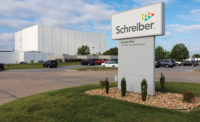Schreiber Foods (Schreiber) is among the largest privately held companies in the United States. The dairy processor ranked No. 74 on Forbes’ 2018 “Americas’ Largest Private Companies” list and posted $5.2 billion in revenues in 2018.
Today, its operations are truly global, extending into Europe, India, Mexico and South America. Its employees — which Schreiber calls “partners” — number almost 8,500.
But when L.D. “Barney” Schreiber, along with minority-interest partners Merlin Bush and Dave Nusbaum, founded the company in Green Bay, Wis., back in 1945, the goal wasn’t to create a multibillion-dollar global operation. Instead, L.D. Schreiber and his partners wanted to operate a process cheese business that would be well-regarded for its integrity, its product quality and, perhaps most important, its strong customer relationships.
Schreiber’ first customer relationships were with the U.S. government and commissaries. A major retailer soon followed. At a time when many other cheese companies were selling product that actually weighed less than advertised, Schreiber took extra steps to ensure that a 1-pound package of its cheese truly weighed 16 ounces.
Seventy-four years later, Schreiber still calls Green Bay home — and is just as committed to integrity, product quality and customer relationships as it was back in 1945. The 100% employee-owned customer-brand manufacturer/co-manufacturer counts retailers, foodservice operators/distributors and consumer packaged goods brands among its loyal customers. It boasts 17 processing, converting and other non-office facilities within the United States — and 17 more outside the country.
New categories, strong growth
Although Schreiber’s roots are in process cheese, the company has diversified its business over the years to meet its customers’ needs and continue to grow. Natural cheese and cream cheese, for example, have been part of Schreiber’ offerings for some time now. And the company added yogurt to the mix about a decade ago.
“We’re now one of the largest yogurt producers in the world,” noted Michael Haddad, Schreiber’s president and CEO.
Haddad explained that Schreiber was “very intentional” about the move into yogurt.
“We felt that it was a healthy long-term trend that yogurt consumption would continue to grow here in the United States,” he said. “We acquired a company so we could get the formulas, the talent and the people and really learn the business.”
From there, growth in the yogurt category came about through a series of plant expansions, other acquisitions and, of course, customer relationships, Haddad said.
“We were one of the first Greek yogurt manufacturers, so we were on the front end of that growth,” added David Kapic, executive vice president, Schreiber U.S.
What’s more, in the past 10 years, Schreiber has substantially broadened its presence and its breadth of offerings overseas. In India, for example, the company is now a very large producer of ultra-high-temperature milk and juices, Haddad noted. It also makes cheese, ghee, skim milk powder and whole milk powder in that country.
“It’s really a milk fractioning operation,” he explained. “We bring in milk as a raw material, and we literally make everything from that milk. … We’re closer to the milk today than we’ve ever been.”
By being closer to the milk, Haddad means Schreiber no longer is just converting or blending cheese like it did for many years. When it entered the cream cheese category back in the early 2000s, the company started to bring in cream and milk. Later, yogurt operations (and India operations) required even more milk.
“We’re still a converter, but we’ve been handling a lot more milk in the last 10 years than we ever have,” Haddad stressed.
It’s also worth noting that Schreiber operates one cheesemaking operation in Tempe, Ariz., as well as a smaller cheesemaking facility in Smithfield, Utah.
Speaking of cheese, Schreiber continues to see strong growth in natural cheese and decent growth in process cheese, noted Tim Walls, executive vice president for Schreiber U.S.
“Our legacy business is process cheese,” he said. “A lot of sandwich-makers in the U.S. went through a fairly dark time in the last 10 years, and now it feels like they’re back.”
Outside the dairy space, Schreiber has started producing some plant-based alternatives as well, Haddad said. Many customers need these offerings so they can stay relevant to their shoppers, and the company’s production assets have capabilities to go beyond dairy.
To better serve its customers, Schreiber even engages in some redistribution of specialty cheeses and other products it doesn’t produce, Kapic added.
More than a manufacturer
Schreiber’s transformation throughout the years transcends new product categories and global operations. The company is now more intent than ever on meeting the evolving needs of its individual retail and foodservice customers, so it added a number of insights- and concept ideation-related capabilities in the last decade.
“To be relevant today — I think that’s the biggest evolution for Schreiber, and I would argue for any private brand company,” Haddad said. “It isn’t just exclusively about manufacturing capability anymore.”
Today, Schreiber boasts an insights team that harnesses information related to consumer behavior, practices and trends, Kapic noted. The team also brings in experts that help the company learn about trends and industry goings-on; it even creates compelling insights-related videos.
“The other thing we do is get in front of our customers, and do things like innovation sessions where we might bring ideas and concepts based on what we know they might be interested in,” he said. “We’ll talk about what it takes to do one of the concepts — and things that could be trending or changing — and we’ll come up with practical solutions for them.”
Schreiber also has an innovation team that comprises key research and development, sales and operations partners, Kapic said. This team brainstorms new concepts that mesh with specific findings gleaned by the insights team.
And almost five years ago, Kapic formed Schreiber’s first product strategies group.
“We were always organized by customers and plants, but what do we ultimately sell? Product,” Haddad stressed. “Today, when we come and bring recommendations, there is research and there are insights to support the recommendations.”
A partner in product development
On the product development front, Schreiber has stepped up its game as well. The company’s products have always been valued for their quality. But Schreiber’s partners have also worked hard in recent years to remove artificial ingredients and preservatives — to meet customer demand for cleaner labels, Haddad said.
In addition, Schreiber’s Green Bay home office building has a number of areas and partners dedicated to product development. A sensory lab is dedicated to sensory research. The building also houses a full pilot plant where partners can perform small-scale production and testing. In addition, it has culinary kitchens where chef partners can replicate the capabilities of many of Schreiber’s foodservice customers to effectively develop and test products, Kapic said.
“Our chefs are often embedded with the customer chefs and working together,” he noted. “They have earned a lot of credibility with some of the biggest names out there. They’re also part of developing solutions for customers that maybe don’t have any culinary expertise.”
Combined with the information from the insights team, the innovation team and the product strategies group, these product development capabilities help Schreiber provide real solutions to their customers’ business challenges, Kapic explained.
Not every customer takes advantage of all Schreiber has to offer, of course. As Walls pointed out, Schreiber’s customers have choices when it comes to product development.
“We will run customers’ specific formulas and recipes; we will co-develop with customers where they have an idea and we have an idea, and we share back and forth in development of the product; and we also just sole-develop our own product solutions and take them out to customers,” he said. “We do all three of those on a weekly basis. We’re flexible and able to pivot to do a lot of different things with customers based on customers’ needs.”
Still, customers increasingly are expecting such augmented capabilities from Schreiber — and from other private brand manufacturers, Haddad said.
“They expect us to be involved with their business, to understand their business, to provide solutions to problems they have and/or solutions to problems they don’t even know they have,” he said.
Increasing visibility
Because Schreiber is not in the branded product business, it is not well-known to U.S. consumers. But the company is betting that it — and other business-to-business food producers — will be visible to those consumers in the near future, thanks to increasing consumer transparency demands, Haddad said. And Schreiber is actively preparing for that day.
“We’ve always cared about our food, our people and our communities. That won’t change, but the visibility others have to those things might. We want to be sure that, when they do, they see a great company that cares,” he explained.
One critical step in making itself more visible was the publication of Schreiber’s corporate responsibility report a couple years back. As Haddad pointed out, the report details real numbers and real goals.
But perhaps even more important are the initiatives Schreiber partners are taking to “brand” the company, he added.
As part of the branding push, the company has stepped up its social media presence, Walls noted. It’s telling stories about how it’s supporting the communities in which it operates, how it treats its partners and how it treats its customers.
“We have great partners who are so proud to work for our company,” he said. “We should tell that story more, and we are.”
At the same time, Schreiber is keenly aware of the need to protect its customers in the current private brand/co-manufacturing environment, Kapic pointed out. If a customer visits a plant that is also running a competitor’s product, for example, the partners working in that plant will ensure that customer stays away from the line running the competitor’s product.
“That actually plays well because then our customers know that they’re being protected; it’s part of how we’ve always done business in our world,” he said. “That allows us to produce for many of the largest brands out there in the food industry as well.”
Investing in technology
Speaking of Schreiber’s plants, they’ve also received a lot of attention in recent years. The company has made a “huge commitment” to plant automation, Walls noted. Ten years ago, for instance, the plants had no robots, and now they have, collectively, “many dozens” of them.
Those and other automation investments help keep Schreiber competitive and also minimize the risk of injury tied to repetitive motion, he said. Systems and processes have also been an in-plant focus.
“We’re a lean organization and we practice lean principles and statistical process control,” Walls said. “That combined with automation and training partners on variation and process is something we’ve done and something that’s going to continue.”
Haddad noted that Walls has been the driving force in Schreiber’s process excellence — professional manufacturing practices that go along with Schreiber’s “great spirit.” He created a project management office, so the company now has professionals who do nothing but help it run projects.
“Their job is to lead us to good outcomes,” he said.
Showing the ‘Schreiber spirit’
Schreiber’s partners can also take credit for much of success and growth the company has realized over the past 74 years. Schreiber encourages and expects a true spirit of partnership.
“We get many compliments from customers going through our plants,” Haddad said. “They are amazed by how many Schreiber partners on the lines will stop and come and shake their hand and will talk to them. … And it makes such a positive impression on them; they leave and feel like our partners are their partners.”
Schreiber’s partners are also engaged in the communities in which they work. As Haddad points out, the company encourages all of its partners to serve in some way, whether it be on nonprofit boards, on committees or as volunteers in organizations that do good works.
Company leadership sets an example here, too. Haddad said Kapic just wrapped up 10 years of serving on the United Way board, while Walls currently chairs the nonprofit Curative organization. And Haddad himself serves on multiple boards.
“There is something to be learned from volunteering for a nonprofit organization where you don’t have power; you don’t have authority,” Haddad said. “You have to work things out for the greater good; the mission is more important than making money. I think those things can carry over into business as well and make us better leaders.”
Good decisions, quality leaders and partners
Looking ahead, Schreiber believes it has the essential ingredients to continue to grow and thrive. As Haddad explained, the company was built on making “really, really good long-term decisions” that have benefited the subsequent generations of partners.
“We feel like the success of our company will be limited only by the quality of our leadership and our partners,” Walls added, “and we invest a tremendous amount of resources in leadership training and partner training — because we really do believe that people will continue to make this company successful.”
With those good long-term decisions and quality leadership and partners in place, Schreiber can also expect the strong relationships it has with its customers to continue to flourish. And the longevity of some of those relationships is a point of pride for the company. With some of its most strategic customers, those relationships are measured in decades, Kapic noted.
Walls added that Schreiber just celebrated the 50-year mark with one of its major customers.
“When you measure your relationships with many, many customers in decades, that’s something we take very, very seriously,” he said. “It’s a privilege and it’s humbling for us to be involved with so many successful food organizations.”








